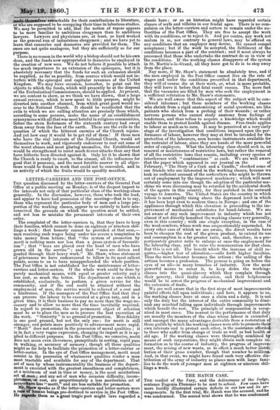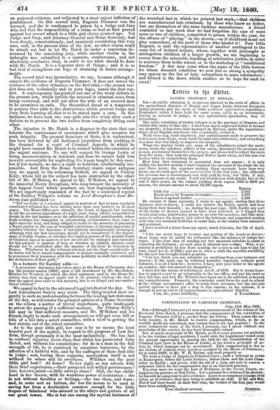THE HATCH CASE.
THE verdict of the Jury, and the deliverance of the Judge, sentence Eugenia Plummer to be sent to school. Few cases have more lucidly illustrated certain defects in our law and its ar- rangements. In the first trial, Mr. Hatch was the accused, and he was condemned. The second trial shows that he was condemned on perjured evidence, and subjected to a most unjust infliction of punishment. On this second trial, Eugenia Plummer was the accused, and she is condemned to prison by a Judge and Jury who feel that the responsibility of a crime so foul as that proved against her cannot attach to a little girl eleven years of age. Yet Judge and Jury, and Attorney-General and Home Secretary, had been deeply, conscientiously, and anxiously considering this very case and, in the present state of the law, no other course could be ;truck out but to let Mr. Hatch lie under a conviction de- nounced by the convicting jury, while another victim iu the imbroglio was submitted to a separate, cumbersome, and, not absolutely conclusive trial, in order to see what should be done with Mr. Hatch. It is a Laputan state of things • and it is so bad that it strengthens our hope of attaining to better arrange- ments.
The second trial was inconclusive, we say, because although it cancels the evidence of Eugenia Plummer, it does not cancel the evidence of the other witnesses on the first trial,—the second ver- dict does not, technically and in pure logic, annul the first ver- dict. A contemporary has pointed out one of the worst defects in the present law, which forbids the accused in criminal cases from being examined, and will not allow the wife of an accused man to be examined on oath. The theoretical dread of a temptation to perjury thus adds to the obstructions which prevent Judge and Jury from learning all that is to be stated upon a case. In this instance, we have seen one case split into two trials after such a fashion as to prevent the two halves from completely fitting each other.
The injustice to Mr. Hatch is a disgrace to the state that can tolerate the continuance of enactments which give occasion for Each iniquity. The present Secretary of State, it is understood, has been deterred by old fashioned prejudices from yielding to the demand for a court of Criminal Appeals, in which he might have caused Mr. Hatch to be retried before the execution of the unjust sentence. No one will suspect Sir George Lewis of being unconscientious or indolent, and thus we cannot hold him morally accountable for neglecting the lesson taught by this case; but if not morally, we have a right to hold him intellectually res- ponsible. And from the Home Secretary stante super antiquas was we appeal to the reforming Bethell, we appeal to Fitzroy Kelly, whose bill on the subject has been obstructed by the other bill of Mr. M‘Mahon, we appeal to Mr. M'Mahon, we appeal to the immortal Henry Brougham, who long foresaw the necessity of that Appeal Court which numbers are now beginning to admit. We are opportunely reminded of the fact by a condensed reprint of Sir Eardley Wilmot's volume on Lord Brougham's Law Re- forms just published :— " The necessity of a criminal appeal in matters of fact to some regularly constituted tribunal has been already more than once insisted on in these rages. The Home Office now virtually the Court of Appeal, but wanting in all the necessary ingredients of a legal court, being wholly unqualified to decide in the last instance as to the infliction of capital punishments, where fresh evidence has transpired or extenuating circumstances have come to light since the trial, and being obliged to resort to the anomaly of procuring a Royal pardon in the case of wrongful convictions, it becomes important to consider whether the functions it has hitherto unsatisfactorily discharged, although with the best intentions, should not be transferred to the depart- ment of Public Justice, or whether the existing powers of the present Court of Criminal Appeal in matters of law should not be enlarged and extended for this purpose to matters of fact, or whether an entirely distinct court "should not be established after the manner of the Cour de Cessation in Trance. Whichever be the tribunal selected, not the least considerable of its duties will be to award compensation to persons unjustly convicted, and to pronounce their innocence with the same publicity as shall have attended the declaration of their guilt."
In a footnote Sir Eardley adds :— " A premature discussion has taken place in the House of Commons dur- ing the present session (1860), upon a bill introduced by Mr. Madiahon, Member for Wexford, in which the chief argument used by the Home Se- cretary was, that an appeal ought not to be granted, whereas the fact is that the appeal does exist at this moment, but to an illegal and unconstitu- tional tribunal."
We appeal in fact to the advanced legal intellect of the day. The Law Amendment Society may assist. The thing wanted most ur- gently is such an understanding between the leading law statesmen of the day, as will render the personal opinion of a Home Secretary on the reform a matter of trivial importance, quite inadequate to arrest the passing of a sufficient measure. Sir Fitzroy Kelly's bill may be that sufficient measure, and Mr. Mlfahon and his friends ought to make such arrangements as will get some bill or title of a bill into a select committee, with a view to getting the best statute out of the select committee.
As to the poor little girl, her ease is by no means the least hopeful part of the matter, in regard to the progress of Law Re- form, though personally it is the most melancholy. She has had to confront injustice worse than that which has persecuted John Hatch, and without his consolations ; for he is a man in the full -strength of life, he is sustained by conscious innocence, by the affection of a faithful wife and by the suffrages of those best able to judge ; and, having these supports, martyrdom itself is not without its solace and its sweetness. Whither can the poor little girl look ? At home? To her eight or ten wheels with their brief experiences,—their pampered self-willed perverseness? Into her own--mind—a little embryo chaos ? Still, she has child- hood in her favour, with its wondrous power of restoration she is not without faculties or feelings,—she has ideas, and tears ; and, in some sort an heiress, she has the means to be used in saving her from a destination common enough for the little forgers of falsehood who abound in the alleys and gutters of all our great towns. She is but one among the myriad instances of the wretched fact to which We pointed last week,—that children are manufactured into crimjnals, by those who know no better, but are themselves of the same luckless manufacture. A friend reminded us last week that we bad forgotten the case of some score or two of children, committed to prison within the year, for the offence of " playing " in the streets,—as if childhood must not play somewhere, at the peril of those who hinder it! Poor little Eugenia is only the representative of another contingent to the same list of doomed infants, whom, together with mistaught or misbegotten children of a larger growth, we are beginning to rescue from the miserable handing of retributive justice, in order to sentence them to the school, or to the workshop of "conditional freedom." A day may come when the name of the little heiress for whose diseased condition we now feel so strong a sympathy may appear on the list of lady subscribers to some reformatory ; and blessed is the dawn which enables 1113 to hope for such an event !



























 Previous page
Previous page